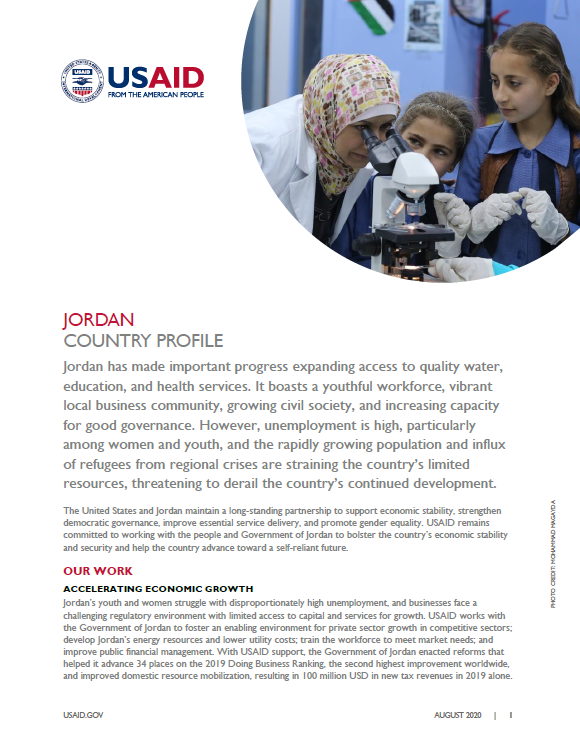Speeches Shim
![]() (261k) Jordan Country Profile
(261k) Jordan Country Profile
BACKGROUND
Jordan has made important progress expanding access to quality water, education, and health services. It boasts a youthful workforce, vibrant local business community, growing civil society, and increasing capacity for good governance. However, unemployment is high, particularly among women and youth, and the rapidly growing population and influx of refugees from regional crises are straining the country’s limited resources, threatening to derail the country’s continued development.
The United States has partnered with Jordan to expand basic infrastructure, support good governance, and promote investment and the growth of industries, trade, entrepreneurship, and tourism. Today, USAID remains committed to supporting Jordan’s economic stability, security, and self-reliance by accelerating economic growth, strengthening democratic governance and accountability, and improving essential service delivery to meet the needs of the people of Jordan.
STRENGTHENING DEMOCRATIC ACCOUNTABILITY
In 2011, King Abdullah II launched a political reform process to increase citizen participation in decisionmaking and to ensure governing institutions are accountable and transparent. USAID supports the King’s vision by strengthening government institutions and citizen participation. USAID programs enhance rule of law, strengthen the process for free and fair elections, build the capacity of parliamentarians to perform their duties, and improve municipal delivery of services. USAID supports civil society organizations to advocate for citizens’ interests, fosters citizen participation in local governance, and increases avenues for youth to engage in political life. In recent years, USAID helped establish and strengthen the Independent Election Commission to monitor elections; developed e-services for citizens to access government services; and developed the technical and administrative capacities of over 950 civil society organizations.
ACCELERATING ECONOMIC DEVELOPMENT
One-third of Jordan’s youth and women are looking for work, and businesses face a challenging regulatory environment with limited access to capital and services for growth. USAID works with the Government of Jordan to foster an enabling environment for private sector growth and investment, particularly in key sectors like tourism, information and communications technology, and medical services; develop the workforce to meet market needs; and improve public financial management. Since 2006, USAID has helped Jordan attract $1 billion in new investments and expanded work opportunities for thousands of people.
IMPROVING ESSENTIAL SERVICE DELIVERY
Population growth and a significant refugee population have strained Jordan’s health, water, and education services, which have been further taxed by the COVID-19 pandemic. USAID partners with the Government of Jordan in health, water, and education to expand infrastructure, build staff capacity to deliver services, and strengthen institutional oversight and community engagement. USAID support includes renovating and modernizing 349 health facilities since 2002; building water and wastewater infrastructure like Zara Ma’in Water Treatment Plant, which provides drinking water to an estimated 1.7 million residents; building, expanding, and renovating 377 schools since 2007 to expand equitable access to education; and establishing 40 non-formal education centers for out-of-school children and youth.
GENDER EQUALITY AND FEMALE EMPOWERMENT
Less the one-fifth of women in Jordan participate in the workforce, political participation remains limited, and violence against women persists. In all of its work, USAID aims to raise awareness of gender issues, strengthen women-focused support services, and support community-led action, advocacy, and policy reform to advance gender equality. USAID facilitated access to finance for over 600 women-owned businesses in 2017; contributed to a 54 percent drop in maternal mortality since 1997 by expanding maternal health services; supported advocacy leading to the abolishment of Article 308, which granted sexual assailants clemency if they married the victim; and provided campaign training to women candidates, contributing to the highest number of women elected in the 2016 parliamentary and 2017 local elections.


Comment
Make a general inquiry or suggest an improvement.